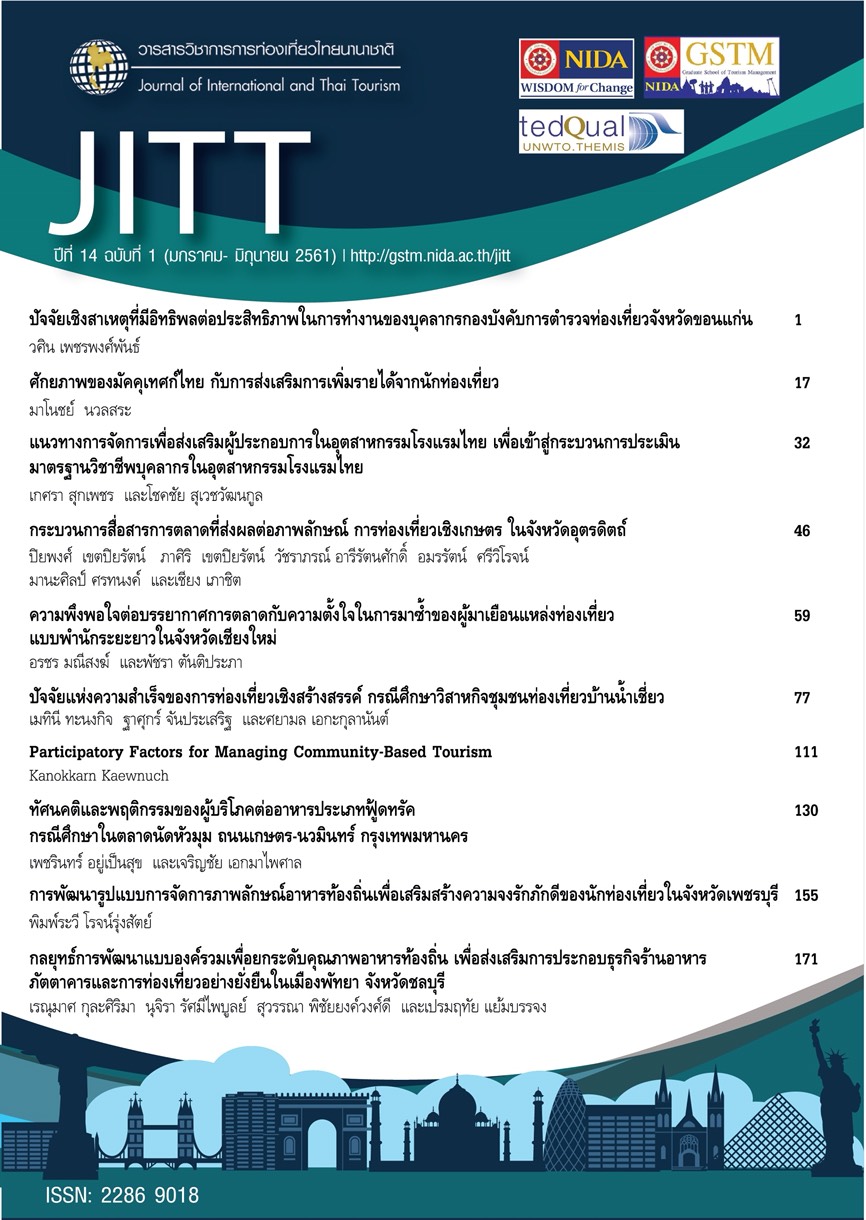ปัจจัยการมีส่วนร่วมเพื่อการจัดการการท่องเที่ยวโดยชุมชน
Main Article Content
บทคัดย่อ
การมีส่วนร่วมของคนในชุมชนการท่องเที่ยว นับเป็นการเสริมพลังอำนาจให้สามารถระดมขีดความสามารถในด้านการจัดการทรัพยากร การตัดสินใจ การควบคุมดูแลกิจกรรมต่างๆ และการพัฒนาศักยภาพของชุมชนให้ทันต่อพลวัตการท่องเที่ยวได้ บทความนี้จึงมุ่งนำเสนอให้ทราบถึงปัจจัยการมีส่วนร่วมเพื่อการจัดการการท่องเที่ยวโดยชุมชน โดยมีวัตถุประสงค์เพื่อวิเคราะห์ความสัมพันธ์และศึกษาปัจจัยที่ส่งผลต่อการจัดการการท่องเที่ยวโดยชุมชนแบบมีส่วนร่วม ซึ่งดำเนินการวิจัยเชิงปริมาณด้วยการเก็บรวบรวมข้อมูลจากการตอบแบบสอบถามของ ผู้มีส่วนเกี่ยวข้องทั้งทางตรงและทางอ้อมกับการท่องเที่ยวโดยชุมชน จำนวน 400 ชุด ผ่านการวิเคราะห์โดยใช้ค่าสัมประสิทธิ์สหสัมพันธ์เพียร์สันและการวิเคราะห์ถดถอยพหุคูณ
ผลการศึกษา พบว่า ปัจจัยการมีส่วนร่วมของประชาชนกับปัจจัยขีดความสามารถของการจัดการการท่องเที่ยวโดยชุมชนไปในทิศทางเดียวกัน อย่างมีนัยสำคัญทางสถิติที่ระดับ 0.05 ส่วนปัจจัยการมีส่วนร่วมของประชาชนมีความสัมพันธ์เส้นตรงกับการจัดการการท่องเที่ยวโดยชุมชนแบบมีส่วนร่วม เมื่อพิจารณาตัวแปรปัจจัยการมีส่วนร่วมของประชาชนแต่ละด้าน ได้แก่ การตัดสินใจร่วมกัน การทำงานร่วมกัน การได้แบ่งผลประโยชน์ร่วมกันและสุดท้ายคือการได้ทำการประเมินผลร่วมกัน มีอิทธิพลเชิงบวกต่อการจัดการการท่องเที่ยวโดยชุมชนแบบมีส่วนร่วม อย่างมีนัยสำคัญทางสถิติ (P < 0.05) จากผลการศึกษานี้นำไปสู่บทสรุปในส่วนของอิทธิพลของปัจจัยที่ส่งผลต่อการจัดการการท่องเที่ยวโดยชุมชนแบบมีส่วนร่วม
Article Details
เอกสารอ้างอิง
Canada’s Far North – A retrospective. In L.C. Harrion and W. Husbands (Eds.) Practicing Responsible Tourism (pp. 296 –329). New York: John Wiley and Sons.
Anderson, C. 2008. The Long Tail: Why the Future of Business is selling Less of More.
CA: Hachette Books.
Ap, J. 1992. Residents Perceptions on Tourism Impacts. Annals of Tourism Research,
19, 665–690.
Ariño, A. 2003. Measures of strategic alliance performance: An analysis of construct
validity. Journal of international Business studies, 34(1), 66-79.
Blank, U. 1989. The Community Tourism Imperative: The Necessity, the Opportunities,
its Potential. State College: Venture Publishing.
Brayley, R., T. Var, & P. Sheldon. 1990. Perceived Influence of Tourism on Social Issues.
Annals of Tourism Research, 17, 285-289.
Burke, A. 1999. Communication and development: A practical guide. London:
Development Division Department for International Development.
Cho, E., & Kim, S. 2015. Cronbach’s coefficient alpha: Well known but poorly
understood. Organizational Research Methods, 18(2), 207-230.
Choibamroong, T. 2007. Tourism by using community for the base of starting point for
sustainable development in the Thai tourism festival (in Thai). Bangkok:
Tourism Authority of Thailand.
Cook, K. 1982. Guidelines for Socially Appropriate Tourism Development in British Columbia.
Journal of Travel Research. 21, 22-28.
Connell, D. 1997. Participatory Development: An approach sensitive to class and gender.
Development in Practice, 7(3), 248-259.
Cooper C., Fletcher J., Fyall A., Gilbert D., & Wanhill S. 2011. Tourism principles and
practice (12th ed.). Harlow: Pearson Education.
Croes, R., Lee, S., & Olson, E. 2013. Authenticity in Tourism in Small Island Destinations:
the Residents’ Perspective. Journal of Tourism and Cultural Change, 11(1-2), 1-20.
Cuppen, E. 2018. The value of social conflicts. Critiquing invited participation in energy
projects. Energy Research & Social Science, 38, 28-32.
De Araujo, L.M., & Bramwell, B. 1999. Stakeholder assessment and collaborative tourism
planning: The case of Brazil’s Costa Dourada project. Journal of Sustainable Tourism, 7(3-4), 356-378.
Felstead, M.L. 2000. Master Plan for Community-Based Eco-Tourism in Ulgan Bay,
Palawan, Republic of the Philippines. Puerto Princesa City (PPC), Philippines: UNESCO-UNDPPPC.
Getz, D., & Jamal, T.B. 1994. The environment–community symbiosis: A case of collaborative
tourism planning. Journal of Sustainable Tourism, 2(3), 152–173.
Goodwin, H., & Santilli, R. (2009). Community-based tourism: A success. ICRT Occasional
Paper, 11(1), 1-37.
Gray, B. 1985. Conditions facilitating Inter organizational Collaboration. Human Relations,
38, 911-936.
Hardy, C., & Phillips, N. 1998. Strategies of engagement: Lessons from the critical examination
of collabo ration and conflicts an in reorganizational domain. Organization Science, 9(2), 217–230.
Heywood, K.M. 1988. Responsible and responsive tourism planning in the community.
Tourism Management, 9(2), 105-108.
Jamal, T.B. & Getz, D. 1995. Collaboration theory and community tourism planning.
Annals of Tourism Research, 22(1), 186–204.
Jamal, T.B., & Getz, D. 1999. Community round tables for tourism - related conflicts: The
dialectics of consensus and process structures. Journal of Sustainable Tourism,
7(3–4), 290–313.
Joppe, M. 1996. Sustainable community tourism development revisited. Tourism Management,
17(7), 475–479.
Keogh, B. 1990. Public Participation in Community Tourism Planning. Annals of Tourism
Research, 17, 449-465.
Kaosa-ard, M. 2007. Tourism Strategic Plan Project 2008 – 2011 (in Thai). Chiang Mai: Social
Research Institute.
Knack, S., & Keefer, P. 1997. Does social capital have an economic payoff?: A cross-country
investigation. The Quarterly Journal of Economics, 112(4), 1251-1288.
Liburd, J.J., & Edwards, D. 2010. Understanding the Sustainable Development of Tourism.
Oxford: Goodfellow Publishers Limited.
Mason, P. 2011. Tourism impacts, planning and management. London: Routledge.
Murphy, P. E. 1983. Perceptions and Attitudes of Decision Making Groups in Tourism Centers.
Journal of Travel Research, 21, 8-12.
National Tourism Policy Committee. 2016. Training Guidelines for Community Tourism
(in Thai). Bangkok: n.p.
Office of the National Economics and Social Development Board. 2016. The Twelfth
National Economic and Social Development Plan (2017-2021) (in Thai).
Bangkok: Office of the Prime Minister.
Reed, A. 2013. A Companion to Diaspora and Transnationalism. Blackwell Publishing Ltd.
Reid, D.G. 2003. Tourism, Globalization and Development: Responsible Tourism
Planning. London: Pluto Press.
Ritchie, J. R. Brent. 1988. Consensus Policy Formulation in Tourism: Measuring Resident
Views via Survey Research. Tourism Management, 9, 99-212.
Russel, P. 2000. Community-based tourism. Travel and Tourism Analyst, 5, 89-11.
Sally Asker; Louise Boronyak; Naomi Carrard, & Michael Paddon. 2010. Effective
Community Based Tourism: A Best Practice Manual APEC TOURISM WORKING GROUP AUTHORS. Institute for Sustainable Futures, University of Technology Sydney May. PUBLISHED JUNE 2010 By Sustainable Tourism Cooperative Research Centre 2010 Gold Coast Campus, Griffith University QLD 4222 Australia.
Sarobol, S. 2004. Community – based Tourism: Concept and experience in Northern
Thailand (in Thai). Chiang Mai: The Thailand Research Fund (TRF).
Stevens, B. 1988. Cooperative Activities in Competitive Markets. In Tourism Research:
Exploring Boundaries, Travel and Tourism Research Association (TTRA), Montreal, Quebec, Canada, pp. 139-141. Salt Lake City: The University of Utah Bureau of Economic and Business Bureau.
Suansri, P. 2003. Community Based Tourism Handbook (in Thai). Bangkok: Responsible
Ecological Social Tour.
Taylor, G. 1995. The community approach: Does it really work?. Tourism Management,
16 (7), 487–489.
Teye, V. 1988. Prospects for Regional Tourism Cooperation in Africa. Tourism Management,
9, 221-234.
The Thailand Community Based Tourism Institute. 2017. Community – based Tourism
Retrieved March 9, 2017, from http://www.cbt-i.org/travel.phpUH.
Tourism Authority of Thailand. 2017. Nakhon Si Thammarat. Retrieved March 9, 2017, from
https://thai.tourismthailand.org/About Thailand/Destination/Nakhon Si Thammarat.
Waddock, S. A. 1989. Understanding Social Partnerships: An Evolutionary Model of
Partnership Organizations. Administration and Society, 21, 78-100.
Weaver, D. & Lawton, L. 2014. Tourism Management (5th ed.). London: Wiley.
Wurzburger, R., Aageson, T., Pattakos, A., & Pratt, S. (2010) Creative Tourism: A Global
Conversation: How to Provide Unique Creative Experiences for Travelers Worldwide. Library of Congress Cataloging-in-Publication Data.
Zins, M. 1987. Successful Tourism Projects Through Cooperative Strategic Marketing
Planning. In Travel and Tourism: Thrive or Survive? Travel and Tourism Research Association 18th Annual Conference, pp. 151-156. Salt Lake City: The University of Utah Bureau of Economic and Business Research.


